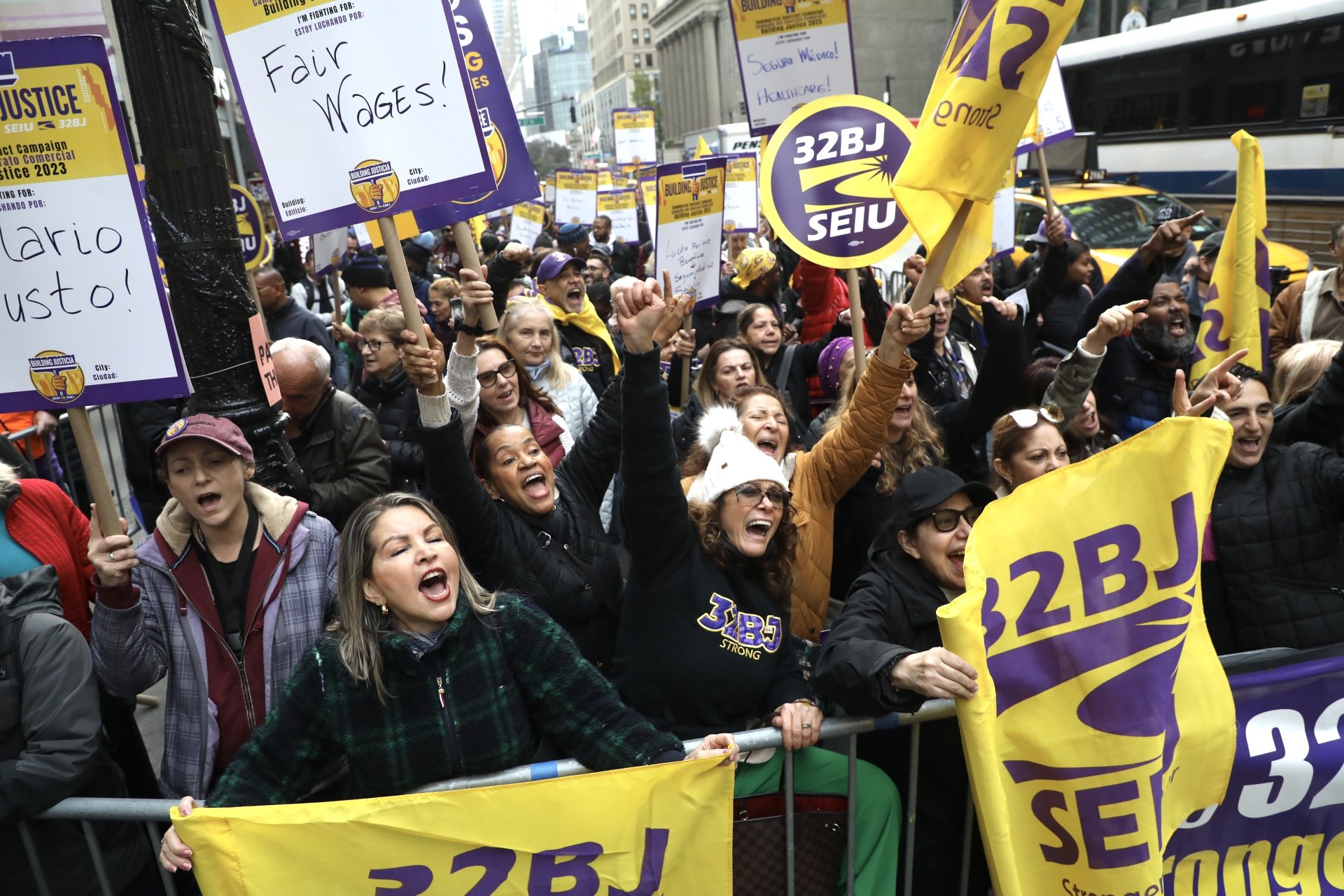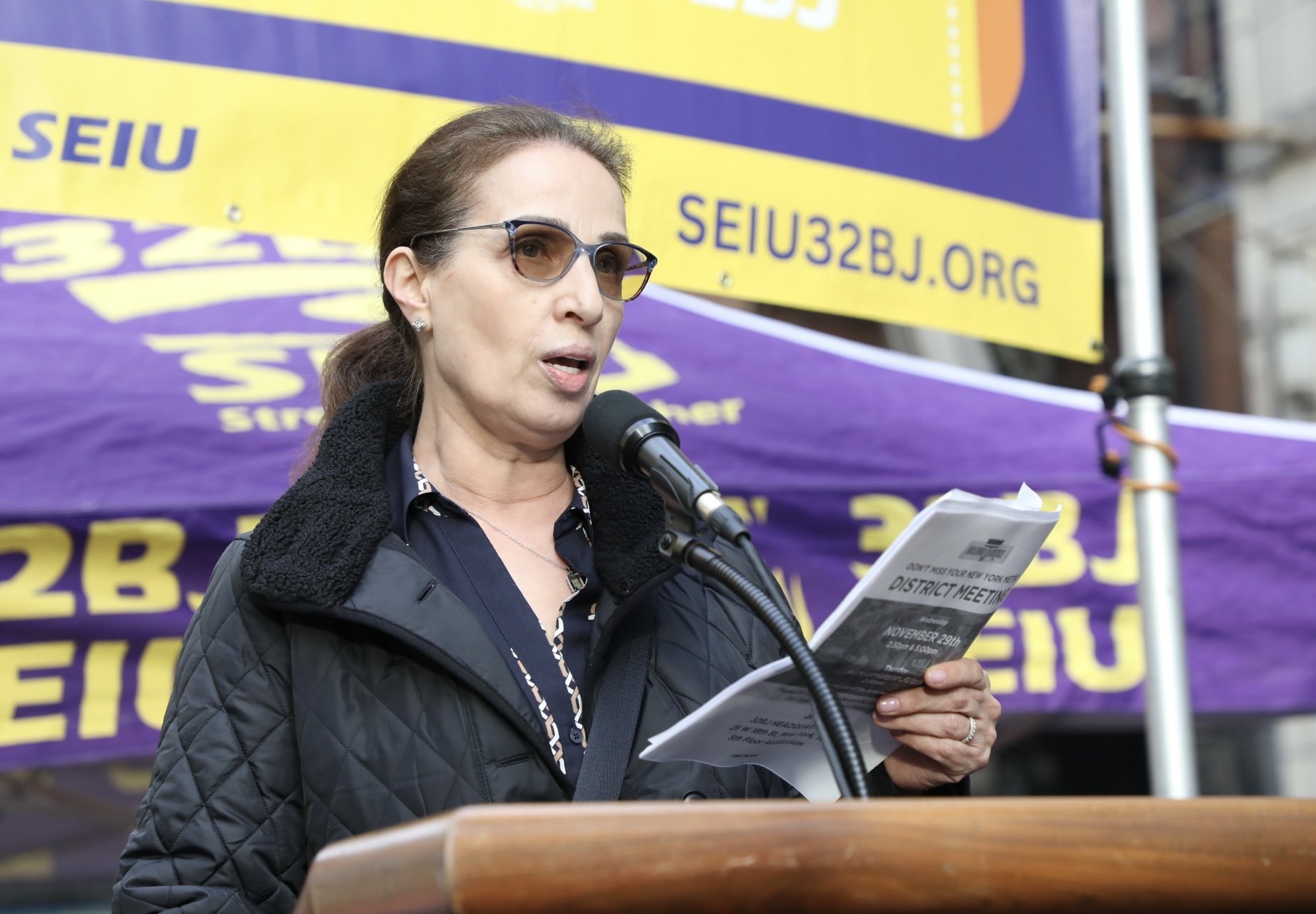20,000 Building Cleaners in NYC Are Set to Strike
NYC office cleaners with 32BJ SEIU rallied for a fair contract on Nov. 9. Today, they are gearing up for a massive strike in response to building owners hoping to erase worker gains. Photos courtesy of 32BJ.
By Steve Wishnia
New York City’s 20,000 commercial-building cleaners will vote Dec. 20 on whether to authorize a strike, 32BJ SEIU announced Dec. 13.
“This is a very challenging negotiation,” 32BJ vice president Denis Johnston says of the union’s contract talks with the owners of 1,300 commercial buildings. “There’s a different tone.”
On Nov. 28, the Realty Advisory Board on Labor Relations (RAB), the trade group that handles the landlords’ negotiations with the union, gave 32BJ a contract proposal that demanded several givebacks. They included having workers pay part of their health-care premiums; a two-tier system in which people hired in the future would get lower wages and benefits; and, in the name of “flexibility,” work-rule changes such as reducing sick days, vacation, and overtime pay, and increasing the area workers are required to clean.
The proposals for a permanent two-tier structure and health-care premiums are both “a strike issue for us,” Johnston told Work-Bites. The union’s health benefits enable workers to have “full-family comprehensive coverage” on base pay of about $60,000 a year, he says. If 32BJ conceded on premiums, “any number opens the door, and once it’s open, you can’t close it.”
The union announced the strike vote after RAB did not withdraw those giveback proposals during a negotiating session Dec. 12.
“We are in full-blown strike preparations,” 32BJ President Manny Pastreich said in a statement. “The RAB has not taken off the table proposals that are clear strike issues for our members. Affordable quality health care should not be on the chopping block for essential workers. We are not going to allow for the gutting of this incredibly important contract.”
The RAB referred a call from Work-Bites to a spokesperson, who did not respond by phone or email. The trade group has previously complained about the rising cost of health care, and that vacancy rates have “skyrocketed” because people are continuing to work remotely since the COVID pandemic waned.
“Without changes to increase flexibility in our [collective-bargaining agreement], the future of the industry and our workers is in jeopardy,” RAB President Howard Rothschild said in a statement posted on Twitter Nov. 9, the day the contract talks began. “Now is time for the union and industry to roll up our sleeves and come together to negotiate a contract that will provide for a sustainable future.”
The contract, which expires December 31, covers the 17,000 cleaners in buildings owned by RAB members, and sets the standard for those where the other 3,000 work, according to 32BJ. The union says it represents 94% of office-building cleaners in New York City — 96% of them in Manhattan.
Workers ‘Struggling’
Office building cleaner and 32 BJ member Drita Gjidoda speaks out against ongoing attacks on working class families struggling to keep their heads above water.
Building cleaners are still recovering from the pandemic, 32BJ says. One-third were laid off at its peak, some for two years, long enough to lose their health insurance before they were recalled to work. The union workforce lost about 2,000 jobs; there were 22,000 before the pandemic hit.
“Our members struggle mightily to get by,” says Johnston. Some, he adds, have moved to the Poconos in Pennsylvania, South Jersey, or the Hudson Valley to find housing they can afford, commuting for more than two hours each way in exchange.
Drita Gjidoda, a Kosovar immigrant who has worked as a cleaner for 17 years, says she and her husband pay $2,800 a month for their two-bedroom apartment in Kew Gardens, Queens. “It’s not just the rent,” she adds. Train fare, food, heat, electricity, and their son’s college tuition all cost more.
“With both of us working, we are struggling,” Gjidoda says. “If I had the time, I would take another job.”
Rafael Ortega, a commercial cleaner for 33 years, said in a statement released by the union Dec. 13 that he and his family had to move from the Bronx to New Jersey “because the cost of living got too high” — and that he’d taken a part-time second job as a taxi driver.
“How am I supposed to afford health-care premiums?” he asked.
Johnston acknowledges that vacancy rates in office buildings have increased. But 32BJ argues that the current contract “already allows” management to reduce the workforce when vacancies rise, or to lower how frequently buildings are cleaned. It says management’s proposed “unnecessary cuts to labor protections and fairness in the workplace” ignore that reality.
“When we hear talk about flexibility, what I hear is instability,” says Gjidoda.
Johnston says 32BJ would like to win improvements to pensions, for the first time in 10 years. But the two sides remain far apart, the union says. It has scheduled a rally on Dec. 20 at West 41st Street and Broadway, with a voice vote on whether to authorize a strike.
“I think it’s going to come down to the wire,” Johnston says.
“We are ready to strike,” Gjidoda says. “More than ready, actually.”


